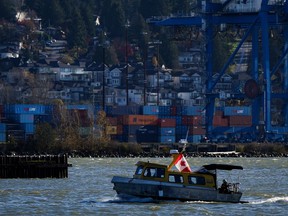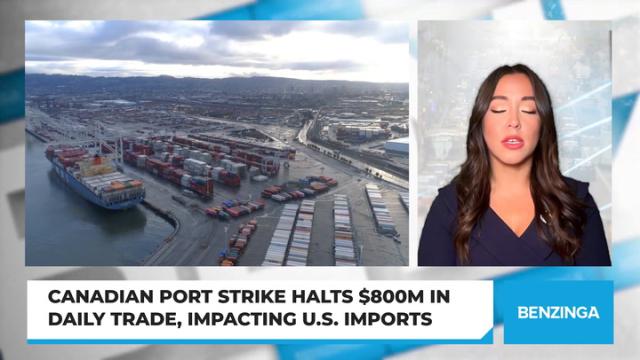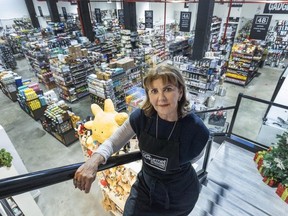B.C. ports are frozen amid a labour dispute. What does this mean for Canadians?
Experts say impact won't be seen on shelves right away, but businesses could take hit
A major trade artery was shut down on Monday when employers locked out more than 700 foremen at ports across British Columbia, sparking fears across the country for Canada's supply chain.
With a partial closure already affecting two terminals at the Port of Montreal due to a separate labour dispute, this new stoppage could see more shipping backlogs for businesses as the window closes on importing goods for the holiday season.
The B.C. Maritime Employers Association (BCMEA) said it had made the "difficult decision" to lock out workers on Monday afternoon, after the International Longshore and Warehouse Union (ILWU) Local 514 issued a 72-hour strike notice for limited job action, which was set to begin at 8 a.m. PT on Monday.
The lockout doesn't apply to grain or cruise operations.
The union said its limited action consisted of an overtime ban and a refusal to implement tech changes on Monday if an agreement wasn't reached. It previously accused BCMEA of "acting recklessly" by threatening the lockout.
Canada's West Coast is its main trade portal for shipping goods by sea.
"Our West Coast ports handle $800 million worth of cargo every single day," Pascal Chan, senior director of transportation, infrastructure and construction at the Canadian Chamber of Commerce, told CBC News. "That accounts for something like 25 per cent of the goods flowing through the country."
What happens next
When the functioning of a major port is impacted, some ships that were supposed to bring goods to that port end up anchored outside it, waiting for the strike to end. This is often the case for ships containing perishable food products, said Fraser Johnson, a professor of operations management at the Ivey Business School at Western University in London, Ont.
But most ships are rerouted — which in this case means more goods intended for Canada being rerouted to U.S. ports on the West Coast, upping the end cost for Canadian businesses.
Freight rates have already increased threefold over the last year due to a number of factors, including problems in the Suez Canal and a drought in the Panama Canal, Johnson said.
The B.C. ports being closed down "affects virtually everything," he said, ranging from food and retail goods for the holiday season to commodities that are exported, such as lumber, coal and automobiles.
"The general rule of thumb is that for every day that the port is shut down, it takes a week to be able to recover," Johnson said.
In Montreal, two terminals are also currently closed after longshore workers went on strike last week, paralyzing 40 per cent of total container capacity at Canada's second-largest port. The Montreal Port Authority stated last Thursday that some ships already on their way to Montreal had turned back to other ports.
The union's main request in B.C. is protections for job security amid increasing automation at the ports. In Montreal, work-life balance is one of the key points at stake for striking workers.
How consumers are impacted
The average Canadian won't see shortages on their grocery shelves or in retail stores in the short term, Johnson said. But if the labour dispute stretches on for several weeks, those impacts could trickle down as costs add up.
"It might not be Day 1, but ... when you start to see millions and millions of dollars in trade lost every single day, absolutely, Canadians are going to feel that," Chan, of the chamber of commerce, said.
Johnson said small- and medium-sized businesses will likely feel the impact first because they don't have as much flexibility in terms of contracts, meaning increased costs and delays when shipment plans change.
For distributors that serve multiple retailers, a big enough delay can mean they can't fulfil their contractual obligations, potentially leading to penalties, according to Christina Santini, director of national affairs at the Canadian Federation of Independent Business (CFIB), a lobby group. In 2023, after a 13-day strike at B.C. ports, manufacturers that relied on glass imports also reported to CFIB that they weren't able to produce goods on their usual timeline.
Those scenarios aren't kicking in yet, Santini acknowledged. But while many CFIB members used to report having three to six months of inventory in advance, she said more of its members now say that they're only stocked two weeks ahead. According to a Friday statement from the Canadian Manufacturers and Exporters, the 2023 strike cost manufacturers an average of $207,000 per day.
"It all comes down to how long the strikes last and what's the backlog," Santini said. "Some businesses are going to be more resilient than others."
When goods aren't flowing through ports, that includes exports. Last year's B.C. ports strike saw B.C. exports fall 23 per cent in July 2023, hitting their lowest point since the pandemic, Chan said.
Fertilizer Canada, which represents Canadian producers and distributors of fertilizers, warned in a statement on Friday that a shutdown of the B.C. ports would cost the industry $9.7 million per day in lost sales revenue of potash fertilizer, of which Canada is the world's largest producer.
Labour Minister Steven MacKinnon said in a Saturday post on X that "federal mediators are on site, ready to assist the parties," but that it is the "responsibility" of the employers and the union to reach an agreement.
"Businesses, workers and farmers are counting on them to get a deal," he said.
The labour disputes at Canada's ports are just the latest in a string of supply chain disruptions, including a four-day strike at grain terminals in September and a temporary shuttering of Canada's two biggest railways in the summer due to a rail strike.
Experts are concerned these disruptions could damage Canada's reputation in international trade.
"Other partners globally have seen Canada as a reliable partner for conducting business," said Hossein Piri, assistant professor with the Haskayne School of Business at the University of Calgary.
"So with continuous threats for supply chain in Canada, it can tarnish our reputation globally, and recovering that is not easy."
Business groups say B.C. port stoppage will
hurt companies, Canadian economy
Rosa Saba
Published Nov 05, 2024 • 
Canadian Port Strike Halts $800M in Daily Trade, Impacting U.S. Imports menu

Canadian Port Strike Halts $800M in Daily Trade, Impacting U.S. Imports
Canadian West Coast port closed Monday as the International Longshore and Warehouse Union launched a labor strike, halting container traffic. This closure impacts around $800 million in daily trade, significantly affecting U.S. markets relying on Canadian ports for goods like chemicals, auto parts, and perishable foods. The contract expired in March, and talks stalled after a 96% strike approval vote in September. This disruption follows earlier strikes in Montreal, affecting 40% of East Coast
“It’s been absolutely brutal. I mean, the timing of this is just really challenging,” said Pascal Chan, senior director of transportation, infrastructure and construction at the Canadian Chamber of Commerce.
Canadian supply chains have been under considerable strain over the past few years, from labour disputes to wildfires and floods as well as the COVID-19 pandemic, he said.
The latest disruption comes less than a year and a half after a 13-day strike by different workers at most B.C. port terminals and just a few months after a countrywide work stoppage at Canada’s two biggest railways.
Greater Vancouver Board of Trade president Bridgitte Anderson said the shutdown will disrupt $800 million in goods every day, warning it could put upward pressure on inflation.
“The Port of Vancouver is far and away the most significant port that we have in Canada,” said Fraser Johnson, a professor of operations management at the Ivey Business School at the University of Western Ontario.
He said the port handles about 45 per cent of the total volume of Canada’s ports, with the next largest being Montreal at about 10 per cent.
“I think a lot of people tend to focus on what’s coming into the country in terms of consumer goods, automobiles, electronics, especially this time of the year, when we’re coming up to the holiday season,” said Johnson.
“But there’s a lot of stuff that gets exported out of Canada. So lumber, commodities like coal, for example, iron ore, all get shipped out of Canada via our West Coast ports.”
Johnson said the longer the port stoppage goes on, the harder businesses’ bottom lines and the economy will be hit.
If it goes on for several weeks, consumers could start to see more of an impact as well, he said.
But for some retail goods that aren’t stockpiled as far in advance, the impact could be more immediate, said Matt Poirier, vice-president of federal government relations at the Retail Council of Canada.
Retailers are still playing catch-up from previous disruptions heading in to their busiest time of year, said Poirier.
“These last-minute holiday goods are arriving and they’re being stopped. So absolutely it won’t take long for empty shelves to start showing up.”
The 2023 B.C. port strike cost manufacturers an average of $207,000 per day, Canadian Manufacturers and Exporters president and CEO Dennis Darby said in a statement Friday.
The Chamber’s Chan urged the government in a statementto “use every tool at its disposal to resolve this dispute.”
The federal government was relatively hands-off in last year’s port dispute, said Johnson — unlike the rail stoppage, which saw the government ask the Canada Industrial Relations Board to order a return to work and binding arbitration, which it did.
Despite the importance of Canada’s ports, Johnson said the rail disruption posed a more imminent threat.
“Railroads touch most of the products that people consume at some point in the supply chain, so they’re really the lifeblood of the Canadian economy,” he said.
“Shutting down a port for a couple of weeks probably isn’t going to be something that people are going to notice, but … a rail disruption would have much more significant economic impact and significant impact on consumers directly.”
On Friday, Fertilizer Canada also raised the alarm about the impending labour disruption, saying the ports are vital for exporting potash overseas and a shutdown would cost the industry $9.7 million per day in lost sales revenue.
The organization said the 2023 dispute cost the fertilizer industry more than $126 million, and had knock-on effects beyond the 13 days workers were off the job: in the months after the stoppage, Canada lost significant market share to Russia in key markets, it said.
“We are once again on the brink of losing access to a critical trade corridor, and potash fertilizer will be one of the hardest-hit commodities,” said president and CEO Karen Proud in a statement.
The organization called on the federal government to amend the Canada Labour Code to “ensure the continuous movement of fertilizer products at ports during labour disputes.”
Nutrien, the world’s largest potash producer, said that its marketing and delivery subsidiary Canpotex is exploring alternatives to mitigate the stoppage’s effect on customers.
However, a prolonged disruption could negatively affect farmers and food security globally, said media relations manager Shawn Churchill in an emailed statement.
On the other side of the country, the Port of Montreal is also in the midst of a dispute, with two terminals closed until further notice as about 1,200 longshore workers began striking at the end of October.
“It’s a double whammy for us,” said the Retail Council’s Poirier, adding that the Montreal disruption disproportionately affects retailers because it’s container traffic.
Retailers have learned lessons from the supply chain disruptions of the past few years, said Poirier.
“Some retailers have been avoiding ports for months already in anticipation of this,” he said.
However, smaller businesses don’t have the same flexibility as larger companies, Poirier said.
“When the costs are exorbitant, which they tend to get, then they’re the ones really … getting the short end of the stick.”
— With files from Chuck Chiang in Vancouver
This report by The Canadian Press was first published Nov. 5, 2024.
The lockout has halted operations at more than a dozen terminals run by Maritime Employers Association members, leaving containers of goods behind picket lines
Author of the article:
Derrick Penner
Chuck Chiang
Published Nov 05, 2024 •

Gourmet Warehouse owner Caren McSherry is among the many local specialty importers now waiting for containers worth of orders stuck behind picket lines as the lockout of 714 longshore foremen at Port of Vancouver terminals stretched through its first full day.
The B.C. Maritime Employers Association locked out the foremen, members of the International Longshore and Warehouse Union Local 514, beginning at 4:30 p.m. Monday in response to limited job action launched by the union after it rejected the association’s last contract offer.
The lockout halted operations at more than a dozen terminals run by Maritime Employers Association members, including the container terminal where McSherry was expecting to receive goods of $60,000 to $100,000 worth of olives, olive oil, spices, rices and gift baskets from Spain.
“It is beyond frustrating,” McSherry said. “I’m beaten up on my retail side with thefts and robberies every day. And then on the importing side, we’re hit with the port (dispute).”
Her shipment represents orders that her salespeople in the importing side of her business, Continental Importers, placed in May for delivery now, which her buyers expected to have on shelves for the holiday season.
“All of us in the importing food business, we’re on pins and needles because our clients … we’ve now disappointed them,” McSherry said. “Obviously, it’s not our fault, but the buck stops (with you).”
In the meantime, McSherry said importers such as herself can only “fret and hope that (Ottawa) steps in and ends it for the sanctity and safety and profitability of the fourth quarter” for businesses.
B.C. Chamber of Commerce CEO Fiona Famulak added her organization’s voice to the call for action.
Famulak said the Chamber supports the right to collective bargaining, but “our port infrastructure is too critical to the health and success of businesses and workers to have this dispute continue one moment longer.”
Some retailers are still playing catch-up from previous disruptions as they head into their busiest season, said Matt Poirier, vice-president of government relations at the Retail Council of Canada.
“These last-minute holiday goods are arriving, but they’re being stopped,” Poirier said. “So absolutely it won’t take long for empty shelves to start showing up.”
The Greater Vancouver Board of Trade relaunched a “port shutdown calculator” that it created during the 13-day labour disruption in 2023, which tracks a cumulative estimate of the value of trade that has been disrupted based on the assumption that such disputes block about $800 million per day in shipments.
The lockout at west coast ports means that all three of Canada’s major container-receiving ports — Vancouver, Montreal and Prince Rupert — are now behind picket lines as the result of labour disputes, said Jordan Atkins, vice-president of the logistics firm WTC Group.
“On the import side, the damage is immediate,” Atkins said. “Every day that (the port) is closed, it’s setting (businesses) back.”
Atkins said there is still a little bit of flexibility for exporters to continue moving cargo that they have in the system to ports, where off-terminal facilities can load them into containers ready for shipment, if the disruption is short.
“We’ve probably got until, I would say, the end of the week before the damage starts to become kind of irreparable,” Atkins said.
The export commodities hurt the most include pulp shipments, lumber and agricultural products, Atkins said. Bulk grains handled by the Canadian Wheat Board are still moving through Port of Vancouver grain terminals, but specialty products such as flax seed, peas, lentils and other legumes are packed into containers destined for terminals now behind pickets.
“We’ve got a lot of cargo coming out, both to Vancouver and (Prince Rupert) as well as out to Montreal,” Atkins said.


No comments:
Post a Comment